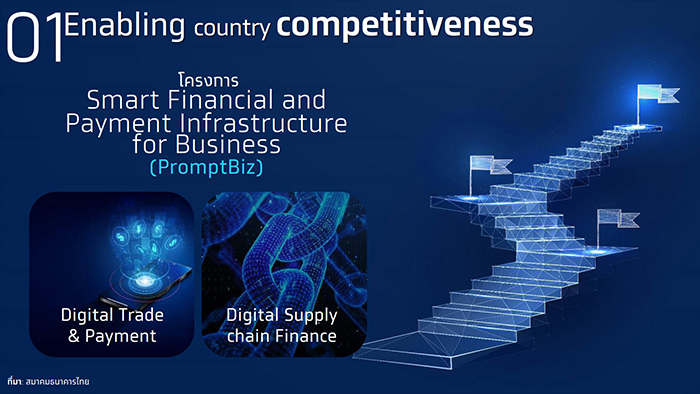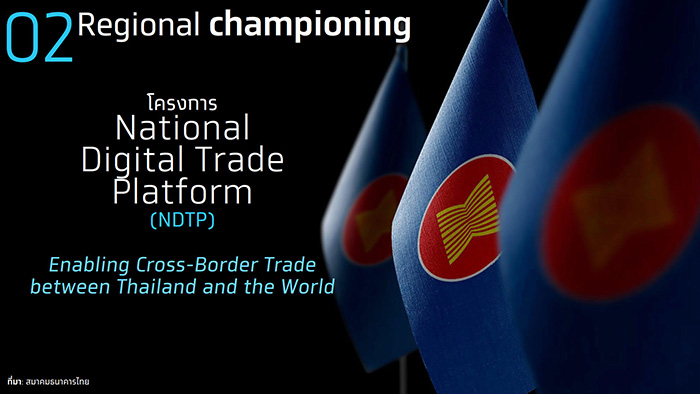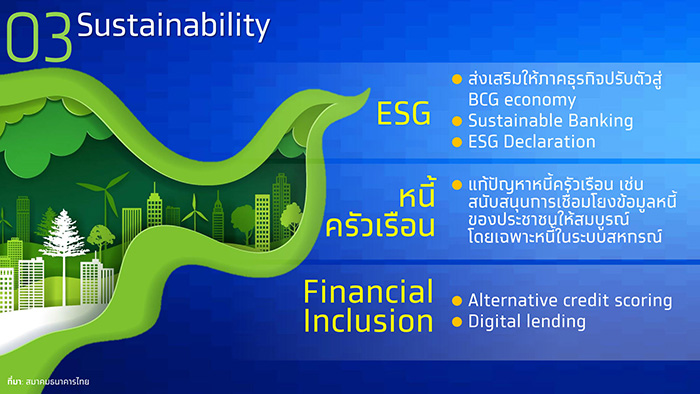Visions
The Thai Bankers’ Association has formulated a roadmap for the development of the commercial banking industry’s financial system over a three-year period. This plan involves adjusting the system to be more relevant to current situations in response to challenges, enhance the quality of service, foster sustainable growth, build trust in the financial system, and elevate the quality of life for all Thai people. Additionally, these efforts aim to enhance Thailand’s competitiveness both regionally and globally. These are achieved by 4 following drives:

1. Enabling Country Competitiveness This drive aims to serve as a significant catalyst in enhancing the country’s competitiveness, using technology to facilitate the transition of the business sector into a more comprehensive digital economic system. Key projects include the Smart Financial and Payment Infrastructure for Business, known as the PromptBiz Project, which aims to develop the connectivity of trade information, payments, financial services, and the government’s taxation system through digital process. The other projects include National Digital ID (NDID) and the e-Signature system, alongside intensive management of personal information and cybersecurity risks. Moreover, it aims to establish a supporting framework for Open Banking, which sets a mechanism for financial users to manage their information across different banks more conveniently through digital platforms, asserting their ownership over their data. Recently, the banking sector has introduced the d-Statement or digital bank statement, a service for exchanging bank statements among financial institutions in a digital format to provide customers with convenience and cost saving.

2. Regional Championing This drive aims to assist entrepreneurs, investors, and individuals in conducting trading activities, international investments, and payments for tourists within the region more rapidly, securely, and at a lower cost. The Association is actively working to enhance the connectivity of digital financial infrastructure in the region, including digital currency issued by Central Bank Digital Currency (CBDC), to facilitate international payments. Key projects include National Digital Trade Platform (NDTP), a collaboration with JSCCIB to transition international trade transactions into a digital system. This effort is designed to increase efficiency, reduce costs and processing time, and create opportunities for small and medium-sized entrepreneurs (SMEs) to better access international trade and credit.

3. Sustainability The banking sector needs to engage actively and contribute to encouraging the private sector to take in consideration the Environmental, Social, and Corporate Governance or ESG. The Association is dedicated to motivating the private sector to align itself with a green economy and the Bio-Circular-Green Economic Model, known as the BCG economy. In collaboration with the Bank of Thailand, the Association has formulated clear operations for Sustainable Banking that are tailored for businesses and adhere to international standards. Moreover, the Association is committed to addressing domestic debts sustainably by enhancing measures both before and after the occurrence of debts. This involves the establishment of a comprehensive credit data center, gathering credit data from various organizations, including banks and other financial institutions beyond banks and savings cooperatives, to facilitate an ultimate solution. Simultaneously, the Association aims to impart financial and digital financial knowledge while constructing mechanisms for financial discipline and promoting savings, particularly savings for retirement. Furthermore, in its mission to reduce inequality and enhance access to financial products and services among individuals and businesses, the association will promote using alternative data for loan assessments and lending on online platforms.

4. Human Capital This drive aims to cultivate human resources equipped with skills essential for the future, enabling them to adapt to changes in the current world and align with the needs of the labor market. The Association actively moves forward to advance upskilling and re-skilling programs for over 130,000 employees in the system of commercial banks. This initiative is designed to enhance their digital literacy, utilizing the online platform of the Thai Banking Academy (TBAC), and elevating TBAC to serve as a national center for financial industry knowledge and research. This effort aims to equip human resources in the financial industry with capabilities to meet financial demands of the digital era according to international standards, to offer products that align more effectively with customer needs. It is closely coordinated with banking business models, emphasizing digital banking with a focus on achieving ultimate agility.
Missions

Supporting collaboration among the member banks to enhance working capabilities and effectiveness, and ultimately fostering increased competitiveness, which yields secure and stable economic growth.
Establishing trust and acceptance by engaging in various stages, both within the domestic landscape and on the international front.
Collaborating with stakeholders, authorities, and government organizations to improve knowledge and understanding of various industries directly impacting the economy, building trust among bank customers, and enabling convenience in services provided by banks with confidence.
